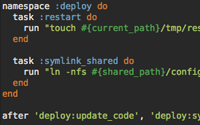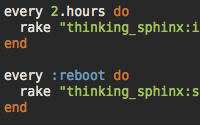Categories
- Active Record
- Active Resource
- Active Support
- Administration
- Ajax
- APIs
- Authentication
- Authorization
- Background Jobs
- Caching
- Code Walkthrough
- Controllers
- Debugging
- Deployment
- eCommerce
- Forms
- Mailing
- Models
- Performance
- Plugins
- Production
- Rack
- Rails 2.0
- Rails 2.1
- Rails 2.2
- Rails 2.3
- Rails 3.0
- Rails 3.1
- Rails 3.2
- Rails 4.0
- Refactoring
- Routing
- Search
- Security
- Testing
- Tools
- Views
Capistrano Tasks (revised)
Learn the basics of writing Capistrano tasks, how to set variables, and run commands on a remote server. Then peak into the internals of Capistrano's deploy tasks to see how they work.
(10 minutes)
Deploying to a VPS
Deploying a Rails application can be overwhelming because there are so many different options. Here I present a pattern for deploying a Rails app to a VPS using nginx, Unicorn, PostgreSQL, rbenv and more.
(18 minutes)
Capistrano Tasks
Do you know how to make Capistrano tasks? See how to change default deployment behavior with custom tasks in this episode.
(8 minutes)
Capistrano Recipes
Get the most out of Capistrano by writing specific recipes with ERB templates. Here I show how to deploy to a blank VPS by running just a few Capistrano commands.
(13 minutes)
Trinidad
Trinidad is designed to serve JRuby web applications and gives you the power of Java while still keeping the feel of traditional Rails deployment. Here I show how to setup a Capistrano recipe, configure it, and more.
(15 minutes)
Monit
Monit can help ensure your Rails app stays up and running smoothly. Here I show how to set it up, receive alerts, and keep tabs on it through a web interface.
(16 minutes)
Zero-Downtime Deployment
Here I show how to accomplish zero-downtime deployment using Unicorn. I also cover gotchas when working with migrations and how to put up a maintenance page when you do need to take down the site.
(12 minutes)
Asset Pipeline in Production
The Asset Pipeline is very useful, but it can be a pain in production. Here I show why it works the way it does, and how to customize it to fit your deployment setup.
(13 minutes)
Cron in Ruby (revised)
Cron is a common solution for recurring jobs, but it has a confusing syntax. In this episode I show you how to use Whenever to create cron jobs using Ruby. Some alternative scheduling solutions are also mentioned.
(6 minutes)
Cron in Ruby
Cron is great for handling recurring tasks, but it is an external dependency with a crazy syntax. In this episode I show you how to use Whenever to create cron jobs with Ruby.
(8 minutes)










